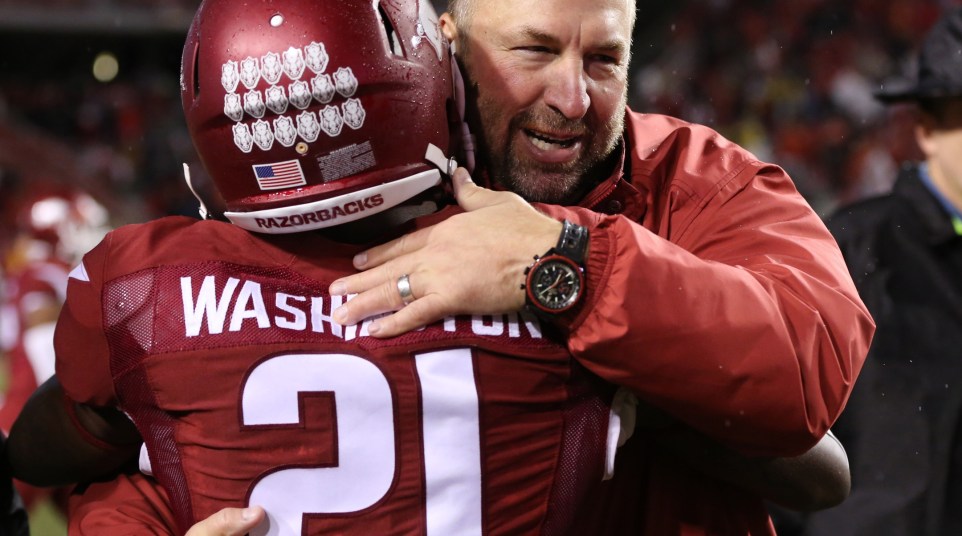Bret Bielema sounds off on player safety, pace of play again
Here we go again.
After former Wisconsin linebacker Chris Borland retired from the NFL at 24 years old Tuesday, citing concerns about his future health if he kept playing football, Bret Bielema couldn’t help himself.
“I’m going to tread lightly,” Bielema told Matt Hayes of The Sporting News, referencing his often-mocked crusade against hurry-up, no-huddle offenses. Then he proceeded to do anything but that.
“We have an obligation to do what’s right. I can’t understand how some guys can’t see that,” Bielema said. “We have to protect student athletes to extremes we never thought of before.
“I just read a study that said players in the no-huddle, hurry-up offense play the equivalent of five more games than those that don’t. That’s an incredible number. Our awareness as a whole has to increase.”
You may recall a fierce, one-sided debate last offseason with a proposed rules change that would’ve required offenses to wait 10 seconds to snap the ball, generating a wellspring of politics and coaches posturing through the media. Alabama’s Nick Saban and Bielema were the most outspoken backers of the rule, which got shouted down before it went to a vote.
Bielema told the Arkansas Democrat-Gazette that “death certificates” were evidence of the player safety issue, referencing the death of a Cal football player during a conditioning practice in February 2014. (The player, Ted Agu, had tested positive for the sickle cell trait, CBS Sports reported.)
According to an ESPN poll, just 25 of 128 FBS coaches favored the proposal, which only was eligible for a vote last year due to its potential link to player safety. Several coaches opposed to the rule, including coaches with up-tempo offenses like Auburn’s Gus Malzahn, Texas A&M’s Kevin Sumlin and Ole Miss’ Hugh Freeze, framed proponents as unable or unwilling to adapt, trying to legislate their way toward a more level playing field.
“(Saban) took it upon himself to go before the rules committee and get it done,” Spurrier said last year, according to USA Today. “They tried to change the rules. But I don’t think they’re gonna get away with it.
“To me, that’s part of football. The ‘no-huddle’ has always been available. I don’t see why we’d take it away right now.”
It seemed misplaced for Bielema to reference the death, which hardly seems related to the proposed rule change. But despite what he later acknowledged was a poor choice of words, Bielema continues to insist that he’s looking out for more than the interests of his preferred style of football.
Bielema recruited and coached Borland at Wisconsin before leaving for Fayetteville, Ark., following the 2012 season.
“I know how much the game means to Chris,” Bielema said, according to The Sporting News. “For him to decide he has had enough, it’s a very sad situation.
“I can’t imagine the thought process he had to go through to get to where he was. It’s not about what we want for the game, it’s about what the game needs.”
Borland cited an increasing amount of disturbing data regarding the long-term health impact of head injuries. Pace of play isn’t the direct topic of discussion here. But it was relatively shocking to see Borland retire, even as his teammate, 30-year-old Patrick Willis, made a similar choice this month.
Willis’ body was starting to break down, while Borland had barely made it into the NFL. For different reasons, both players decided protecting their health was more important than to continue to make money playing football.
There was no need to relate that back to pace of play in this instance. Bielema is picking at a scab that may have already healed by reviving the “no-huddle offenses are dangerous” argument.
Whether or not you agree with Bielema’s point of view, he makes some salient points about protecting the health of players. Bielema is right in that the last few years have unearthed a lot of new medical information that coaches and others with authority in the game of football never considered previously. It is important that those with influence discuss health-related issues in football and make sure that everyone is making decisions that best protect the players and the future of the game.

